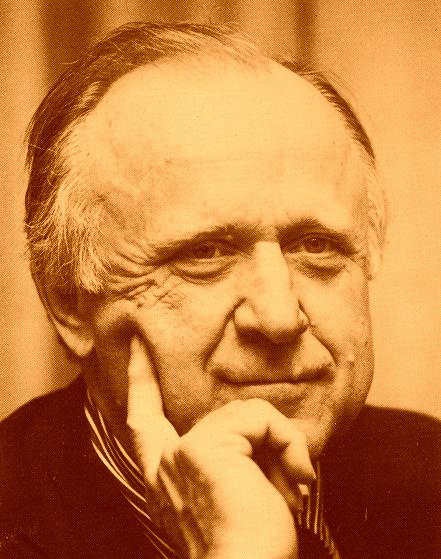Frank Patrick Herbert
(1920-1986)

"Somewhere between my twentieth
and thirtieth years, I began to suspect I was on a railway trip, and instead
of a conductor and engineer, my journey was under the direction of a movie
projectionist. This projectionist with his little machine situated somewhere
in my consciousness carried major influence over what I perceived as reality.
If something disagreed with projection-reality, a filter dropped
into place and I did not sense that disagreement. Nothing came through.
But if something agreed with projection-reality, the spotlights
came on, the music, the drama, the amplifiers. I became engrossed and all
too willing to suspend my critical sense of disbelief.
Motion and illusion, that's
all it was.
With this thought came a
gigantic suspicion: Perhaps even the motion was unreal. Who needs motion
when he has a projectionist as talented as this? There was no trip at all,
no waystops, no terminals - just that projectionist throwing his illusions
upon the colossal screen which was my sense of reality."
(Frank Herbert about himself
in his outstanding introduction to Frontiers, 1:
Tomorrow's Alternatives,
ed. by Roger Elwood, Collier Books 1973, p. 14-15)
American sci-fi giant who received
Locus Poll Award in 1975 and 1987, Hugo Award in 1966, Nebula Award in
1965, Apollo Award in 1978, and also the International Fantasy Award (the
latter for The Dragon in the Sea).
Frank Herbert, famous especially
for his "Dune Series", was often interested in immortality. The following
quotations are from his novel The Heaven Makers (Avon Books 1968),
first NEL (New English Library) edition June 1970, reprinted January 1973;
Magazine Appearances: Part 1 of 2 - Amazing Stories, April 1967;
Part 2 of 2 - Amazing Stories, June 1967.
a quotation from Frank Herbert's The Heaven
Makers:
""Is it not an ultimate artistry,"
Fraffin asked, "if I used a microscopic incident to show you immensity?
I take the Forever-Now right here." He lifted and clenched fist, extended
it toward Kelexel, opened it to show the palm. "I give you something you
don't have - mortality.""
(Frank Herbert:
"The Heaven Makers", Avon Books 1968)
"What were we - once? he
wondered.
There was the Chem curse:
the infinite had no antiquities."
(Frank Herbert:
"The Heaven Makers", Avon Books 1968)
"In this moment, Kelexel
had to remind himself that creatures such as Ruth had lived long (by their
standards) in dreams that Fraffin wove. Not exactly dreams, though, because
Chem spactators could enter the story world, too. In a sudden burst of
insight, Kelexel realized he had entered the world of violence and emotion
which Fraffin had created. Entering that world, he had been corrupted.
To share the native delusions if only for a moment was to be enslaved by
the need for more such corruption.
Kelexel wanted to tear himself
away from this room, renounce his new pet, return only to his duty. But
he knew he couldn't do that. Knowing this, he wondered what particular
thing had trapped him. No answer came to his watching awareness.
He stared at Ruth.
These natives are a dangerous
flame, he thought. We don't own them! We're their slaves!"
(Frank Herbert:
"The Heaven Makers", Avon Books 1968)
"Watching the scene, Kelexel
had the sensation that Thurlow was reaching through Murphey to the pantovive's
audience. He felt that he himself was being examined by the witch doctor.
Logically, Kelexel knew this scene already was in the past, that it was
a captured record. There was an immediacy about it, though, a sensation
of moving freely in time."
(Frank Herbert:
"The Heaven Makers", Avon Books 1968)
""But we do not die!"
Kelexel began to chuckle.
This Thurlow was, after all, so transparent and easy to beat in an argument.
He controlled his chuckling, said: "We are mature beings who..."
"You're not mature," Thurlow
said.
Kelexel glared at him, remembering
that Fraffin had said this same thing. "We use your kind for our amusement,"
he said. "We can live your lives vicariously without a... "
"You came here to ask about
death, to play with death," Thurlow said, blurting it out. "You want to
die and you're afraid to die!"
Kelexel swalowed, stared
at Thurlow in shock. Yes, he thought. That's why I'm here. And this witch
doctor has seen through me. Almost of itself, his head executed a betraying
nod.
"Your mechanical device is
a closed circle, a snake with its tail in its mouth," Thurlow said."
(Frank Herbert:
"The Heaven Makers", Avon Books 1968)
""I've seen you," Thurlow
said. "And I know that any school based on mechanism is a closed circle
of limited logic. The truth can't be enclosed in a circle. The truth's
like countless lines radiating outward to take in a greater and ever greater
space."...
"In time, a curious thing
happens to such schools," Thurlow said. "Your foundation philosophy begins
to circle away from its original straight line. You're close at first.
The error isn't recognized. You think you're still on course. And you swing
farther and farther afield until the effort to devise new theorems to explain
the preceding ones becomes more and more frantic."
"We're totally successful,"
Kelexel protested. "Your argument doesn't apply to us."
"Past success based on past
truth isn't proof conclusive of a continuing success or continuing truth,"
Thurlow said. "We never actually attain a thing. We merely approach various
conditions. Every word you've said about your Chem society betrays you.
You think you have the ultimate answers. But you are here. You feel trapped.
You know unconsciously that you're in a fixed system, unable to escape,
forced to circle endlessly... until you fall.""
(Frank Herbert:
"The Heaven Makers", Avon Books 1968)

